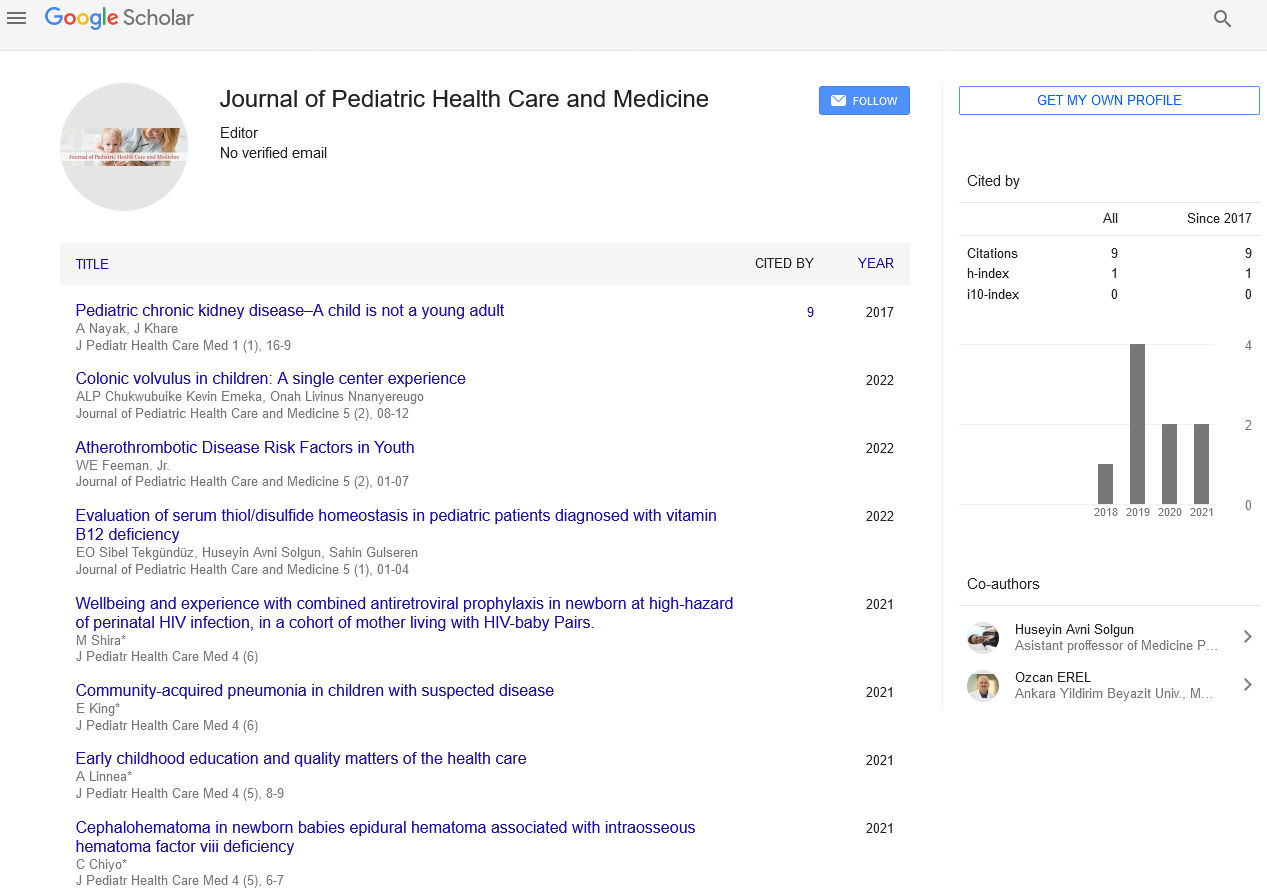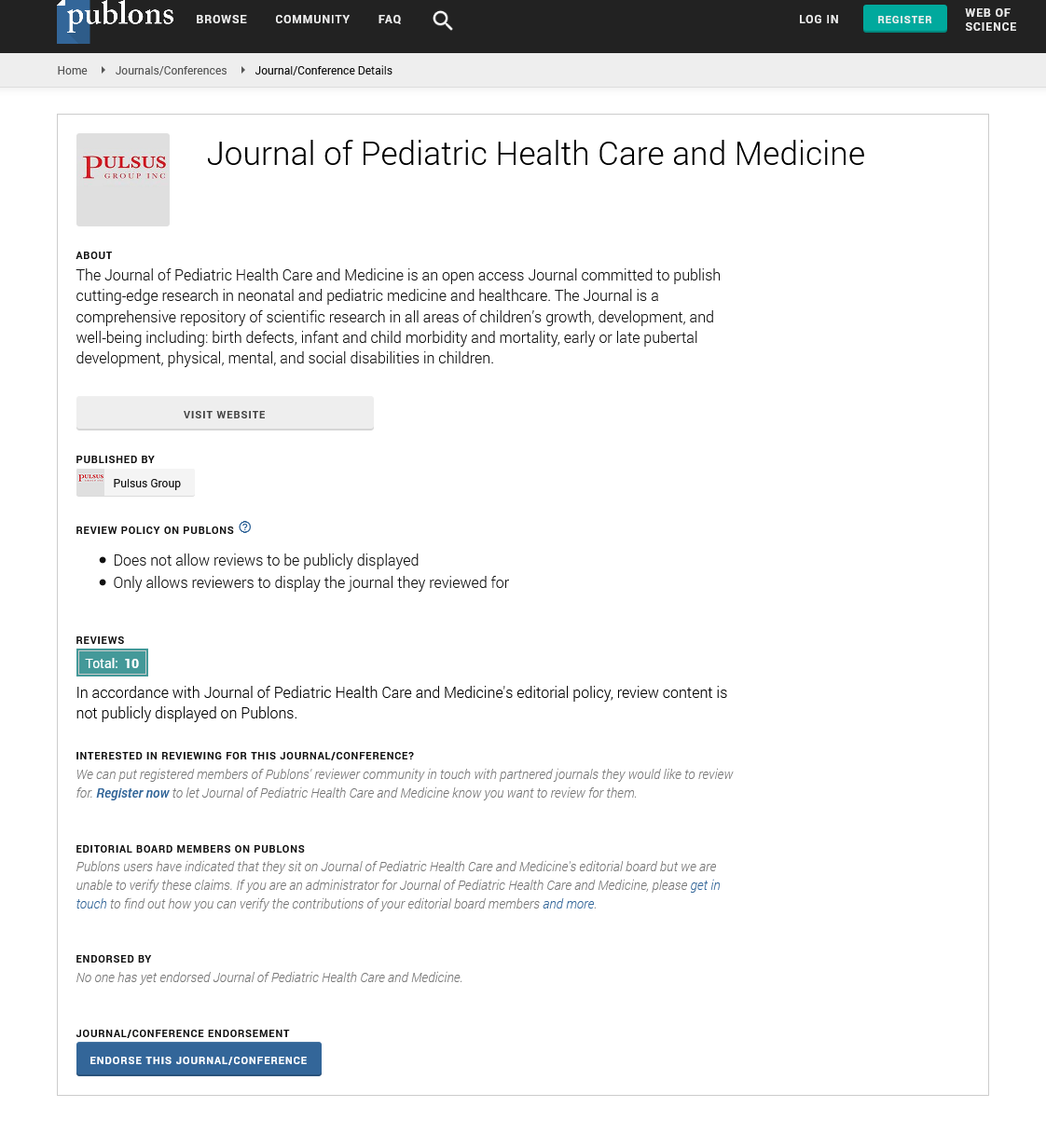Analysis on breastfeeding and its relevance to child and mothers weight
Received: 06-Jan-2022, Manuscript No. PULJPHCM-22-4103; Editor assigned: 23-Mar-2022, Pre QC No. PULJPHCM-22-4103 (PQ); Accepted Date: Jan 10, 2022; Reviewed: 18-Mar-2022 QC No. PULJPHCM-22-4103; Revised: 24-Mar-2022, Manuscript No. PULJPHCM-22-4103 (R); Published: 24-Jan-2022, DOI: 10.37532/ puljphcm.2022.5(1).5-6
Citation: Woods M. Analysis on breastfeeding and its relevance to child and mothers weight. J Pedia Health Care Med. 2022;5(1):05-06.
This open-access article is distributed under the terms of the Creative Commons Attribution Non-Commercial License (CC BY-NC) (http://creativecommons.org/licenses/by-nc/4.0/), which permits reuse, distribution and reproduction of the article, provided that the original work is properly cited and the reuse is restricted to noncommercial purposes. For commercial reuse, contact reprints@pulsus.com
Abstract
The objective of this paper was to look at the effects of nursing on both mothers’ and infants’ weight. The current study examines two subjects: the impact of breastfeeding on the mother’s weight and the impact of nursing on the baby’s weight. Breastfeeding will be better understood as research methods and technology growth, and fundamental mechanisms, metabolic pathways, and factors should be investigated further in the future.
Keywords
Breastfeeding; Pregnancy outcome; Postpartum weight retention; Nutritional status
Introduction
Breast milk is well-known as the finest source of nutrients through infancy and early childhood, promoting healthy growth. Breast milk also contains a variety of unique and dynamic bioactive components that are important for the immune system’s development [1]. The World Health Organization recommended that newborns be exclusively breastfed until they are six months old and breastfeeding should be continued until they are at least two years old [2,3]. Governments throughout the globe are taking steps to enhance breastfeeding rates and lengthen nursing periods, despite the fact that breastfeeding rates remain low. Both babies and moms benefit from breastfeeding. Breastfeeding aids in the weight loss of new moms after childbirth. Hundreds of extra kcal of calories can be eaten each day through nursing. Furthermore, nursing benefits infants in both the short and long term [4-8]. Human breast milk, particularly colostrum, is critical for improving the nutritional and health condition of neonates and babies, avoiding infectious illness, and lowering the risk of allergic disorders and mortality.
Effect of breastfeeding on infant weight
Breastfeeding shields children from malnutrition in a variety of ways, including weight loss, growth retardation, underweight, and vitamin insufficiency [9]. Obesity in children has sparked considerable concern in both developed and developing countries. Childhood obesity is on the rise and has become a serious public health issue. Although it is still debatable whether breastfeeding can reduce the risk of obesity in children, increasing epidemiological evidence suggests that adequate breastfeeding and extending breastfeeding time can effectively delay the growth rate of children’s body mass index and reduce the risk of obesity [10]. Children breastfed for 2 months were more likely than children breastfed for 6 months to have excess body weight. A research examined mothers and infants at 3, 10, 60, 120, and 180 days after birth in seven locations, with 130 nursing women attending five sessions. Due to a lack of nursing frequency in non-Exclusive Breastfeeding (nEBF) babies, formula replaced breast milk consumption; however nEBF infants did not gain weight [11]. An earlier research found that formula-fed children were more likely to be overweight, and that exclusive breastfeeding might prevent this [12]. According to Owen’s research, the prevalence of obesity in adolescent years is decreased by 15%-30% when compared to newborns fed artificial baby formula, and breastfeeding length is inversely linked to the risk of being overweight [13]. A meta-analysis also found a strong negative association between breastfeeding length and the prevalence of childhood obesity, with the obesity rate decreasing by 4% for every month of nursing [14]. Obesity in mothers is a risk factor for obesity in children. At this time, it is estimated that over 40% of pregnant women are overweight. It was discovered that variations in the human milk metabolome are linked to maternal obesity. Obese moms’ milk metabolites can influence the body shape of their infants.
Effect of breastfeeding on maternal weight
Postpartum weight retention is prevalent in women, increasing the risk of being overweight or obese in the long run. Breastfeeding, on the other hand, has a significant energy cost that contributes to the mothers’ overall energy expenditure, raising the likelihood of a negative energy equilibrium, which might lead to weight loss [15]. Several studies have shown a link between nursing and weight reduction after childbirth, whereas others have found no such link. 350 pairs of mothers and children in hospitals in Brazil were monitored for two years in a research. 23.6% of moms and children were determined to be overweight. Pregnant women who nurse for less than 2 months were more likely to be overweight than those who breastfed for 2 months to 6 months, indicating that the shorter the breastfeeding period, the greater the risk of maternal obesity [16]. Breastfeeding moms lowered postpartum weight by 0.38 kg compared to bottle-fed mothers, according to a meta-analysis of 14 cohort studies [17]. Within 72 hours and 6-8 weeks after birth, one study looked at the physical and mental health of 70 obese women who were exclusively breastfed or mixed-fed (including formula milk) and 70 healthy weight women, and revisited the breastfeeding rate at 6-8 weeks [18].
Conclusion
Many prior researchers have identified the effects of nursing on infant and maternal weight, and the great majority of studies support the advantages of breastfeeding on healthy weight of mothers and infants, according to the review of literatures above. In order to give further evidence to promote breastfeeding, future study may focus on potential mechanisms.
REFERENCES
- Thai JD, Gregory KE. Bioactive factors in human breast milk attenuate intestinal inflammation during early life. Nutrients. 2020; 12(2):581.
Google scholar CrossRef - Mosca F, Giannì ML. Human milk: Composition and health benefits. Pediatr Med Chir. 2017; 39(2): 155.
Google scholar CrossRef - Bellù R, Condò M. Breastfeeding promotion: Evidence and problems. Pediatr Med Chir. 2017; 39(2): 156.
Google scholar CrossRef - Holmberg H, Wahlberg J, Vaarala O, et al. Short duration of breast-feeding as a risk-factor for β-cell autoantibodies in 5-year-old children from the general population. Br J Nutr. 2007; 97(1): 111-116.
Google scholar CrossRef - Kull I, Melen E, Alm J, et al. Breast-feeding in relation to asthma, lung function, and sensitization in young schoolchildren. J Allergy Clin Immun. 2010; 125(5):1013-1019.
Google scholar CrossRef - Oddy WH, Holt PG, Sly PD, et al. Association between breast feeding and asthma in 6 year old children: findings of a prospective birth cohort study. Bmj. 1999; 319(7213):815-819.
Google scholar CrossRef - Mezzacappa ES, Katkin ES. Breast-feeding is associated with reduced perceived stress and negative mood in mothers. Health Psychology. 2002; 21(2):187.
Google scholar CrossRef - Schack-Nielsen L, Michaelsen KF. Breast feeding and future health. Curr Opin Clin Nutr Metab Care. 2006; 9(3):289-296.
Google scholar CrossRef - Scherbaum V, Srour ML. The role of breastfeeding in the prevention of childhood malnutrition. World Rev Nutr Diet. 2016; 115: 82-97.
Google scholar CrossRef - Owen CG, Martin RM, Whincup PH, et al. Effect of infant feeding on the risk of obesity across the life course: a quantitative review of published evidence. Pediatrics. 2005; 115(5):1367-1377.
Google scholar CrossRef - Jia N, Gu G, Zhao L, et al. Longitudinal study of breastfeeding and growth in 0-6 month infants. Asia Pac J Clin Nutr. 2018; 27(6):1294-1301.
Google scholar CrossRef - Hanicar B, Mandić Z, Pavić R. Exclusive breastfeeding and growth in Croatian infants--comparison to the WHO child growth standards and to the NCHS growth references. Coll Antropol. 2009; 33(3): 735-741.
Google scholar CrossRef - Thomas H, Renate B, Gerd K, et al. Duration of breastfeeding and risk of overweight: A meta-analysis. Am J Epidemiol. 2005; 162(5):397-403.
Google scholar CrossRef - Isganaitis E, Venditti S, Matthews TJ, et al. Maternal obesity and the human milk metabolome: Associations with infant body composition and postnatal weight gain. Am J Clin Nutr. 2019; 110(1):111-120.
Google scholar CrossRef - Lambrinou CP, Karaglani E, Manios Y. Breastfeeding and postpartum weight loss. Curr Opin Clin Nutr Metab Care. 2019; 22(6): 413-417.
Google scholar CrossRef - Mastroeni MF, Mastroeni S, Czarnobay SA, et al. Breast-feeding duration for the prevention of excess body weight of mother-child pairs concurrently: A 2-year cohort study. Public Health Nutr. 2017; 20(14): 2537-2548.
Google scholar CrossRef - Jiang M, Gao H, Vinyes-Pares G, et al. Association between breastfeeding duration and postpartum weight retention of lactating mothers: A meta-analysis of cohort studies. Clin Nutr. 2018; 37(4):1224-1231.
Google scholar CrossRef - Swanson V, Keely A, Denison FC. Does body image influence the relationship between body weight and breastfeeding maintenance in new mothers? Br J Health Psychol. 2017; 22(3): 557-576.
Google scholar CrossRef






